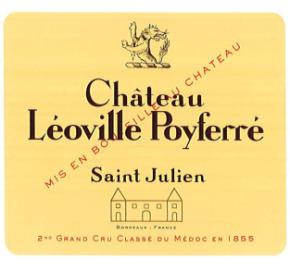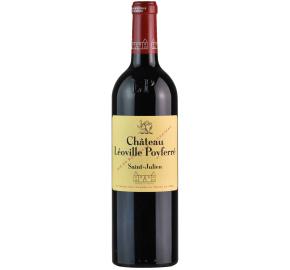Chateau Leoville Poyferre 2005
- Producer Chateau Leoville Poyferre
-
Blend
68% Cabernet Sauvignon
26% Merlot
6% Petit Verdot - Country France
- Region Bordeaux
- Appellation Saint-Julien
- UPC 0 15643 42458 8
Log in to view pricing and order online
Don't have an account? Register here
Item# 1659-05
James Suckling
94pt
Wine Enthusiast
94pt
Wine Spectator
92pt
Wine Advocate
93pt
Tasting notes
Colour: very dark.
Nose: Powerful and very complex; empyreumatic (coffee, cocoa, toasty) with great freshness and purity in the black fruit aromas.
Attack: frank, fleshy and silky.
Palate: full-bodied, revealing fine tannins which are both elegant and powerful.
Particularly lingering aromatic finish.
Nose: Powerful and very complex; empyreumatic (coffee, cocoa, toasty) with great freshness and purity in the black fruit aromas.
Attack: frank, fleshy and silky.
Palate: full-bodied, revealing fine tannins which are both elegant and powerful.
Particularly lingering aromatic finish.
The Chateau
Leoville is located in Saint-Julien, 45 km north-west of Bordeaux, in the heart of the Medoc region. With origins dating back to 1638; Leoville was the largest vineyard in the Medoc region at the time of the French Revolution. Leoville Poyferre springs from various divisions and successions in 1840. The outstanding quality of Leoville Poyferre wines gained early recognition when it was ranked 2nd Growth in the 1855 classification. Chateau Leoville Poyferre was acquired in 1920 by the Cuvelier family, wine merchants in Lille since 1804. The various divisions throughout the history of the estate have split the vineyard of Leoville Poyferre into five large areas. They include all the main types of gravelly soil present in Saint Julien: Mindel II gravel along the river banks and Mindel I type on the far end. This diversity contributes to the amplitude and complexity of the Leoville Poyferre wines. The terroir of Leoville Poyferre has been planted with vineyards producing fine wines for three centuries. Leoville Poyferre boasts a permanent observation system of the underground water tables, showing the excellent drainage conditions of the whole vineyard. This system also establishes an estimated minima for root depth. To avoid accumulation of water on the surface, we regularly decompact the soil of our plots.
2005 vintage
At the end of a quite mild and dry winter, the lower water levels encouraged a prompt start in the growth cycle of the Merlot and Petit Verdot grape varieties, although the budburst for the Cabernet Sauvignon took longer. A cold and dry spring followed by high temperatures at the end of April, and summer temperatures through the May afternoons, were to favour the very rapid development of the vine. The hot and sunny weather in May allowed a short and regular flowering. During the whole growing season, the good average temperatures and the luminosity contributed to the synthesis of the sugar, suggesting the probability of high potential alcoholic degrees. The rainfall was rare and light. The vines were almost suffering from a water shortage. At the end of July, heavy rainfall guaranteed a satisfactory water supply to the plants. August was a beautiful month, ripening the grapes spendidly. The skins already had an excellent tannin-anthocyanin balance. At the beginning of September the ripeness tests and berry tastings showed particularly high degrees and corresponding acidity levels. Thanks to the perfect mastery of the yield, we obtained interesting tannins with good concentration and organoleptic qualities.
Winery Technical Data
Vineyard Area: 200 acres
Grape varieties: 65% Cabernet Sauvignon, 25% Merlot, 8% Petit Verdot, 2% Cabernet Franc
Soils: Garonne gravel
Vines: traditional double Guyot pruning, soil cultivation, organic fertilizer
Harvesting by hand Second sorting by hand after de-stemming Plot by plot vinification Thermo-regulated stainless steel vats 50% malolactic fermentation in barrels Ageing in French oak barrels for 18 to 20 months (75% new barrels, 25% one use)
Grape varieties: 65% Cabernet Sauvignon, 25% Merlot, 8% Petit Verdot, 2% Cabernet Franc
Soils: Garonne gravel
Vines: traditional double Guyot pruning, soil cultivation, organic fertilizer
Harvesting by hand Second sorting by hand after de-stemming Plot by plot vinification Thermo-regulated stainless steel vats 50% malolactic fermentation in barrels Ageing in French oak barrels for 18 to 20 months (75% new barrels, 25% one use)


